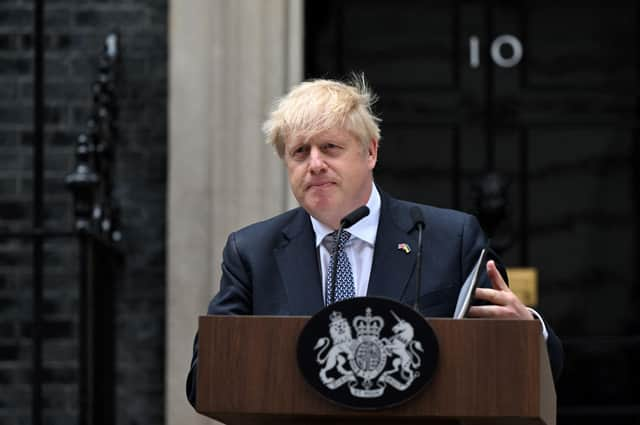The prime minister Boris Johnson lost the confidence of so many people around him


What is frequently described in the media as the ‘race’ to the top position has now been reduced to just two competitors, Rishi Sunak and Liz Truss, with the choice between them to be decided by the party membership in the coming weeks.
Yet there was one parliamentary moment over the past weeks that I for one did find heartening.
Advertisement
Hide AdAdvertisement
Hide AdIt was when Sajid Javid revealed live on the BBC that he had resigned from Boris Johnson’s cabinet more or less immediately after listening to a sermon that had spoken to him about integrity.
Here was an accomplished politician — a former Health Secretary, Home Secretary and Chancellor of the Exchequer — who had the humility to look critically into his soul and the courage to do what he considered to be the right thing, even at the cost of his job which of course brought with it many privileges, not least a seat around that cabinet table.
Sajid Javid’s resignation on July 5 followed that of the former chairman of the Conservative party (and minister without portfolio), Oliver Dowden, on June 24 over the party’s losses in two by-elections, and the June 30 resignation of the government’s deputy chief whip, Chris Pincher, in the wake of a fateful scandal.
However, Mr Javid’s resignation was the first of a veritable avalanche of resignations that took place over July 5–7.
Advertisement
Hide AdAdvertisement
Hide AdMr Johnson simply had lost the confidence of so many around him in close political proximity.
Indeed, despite his obvious abilities in parliamentary oratory and the massive majority he had won for the Conservative party, during a television leadership campaign debate not one of the candidates would volunteer to have him in their cabinet.
It used to be said that Mr Johnson would be the kind of person with whom one could enjoy a visit to a pub, while his chief political opponent, Sir Keir Starmer, would not be a candidate for any jolly excursion — although it subsequently transpired that Sir Keir can indeed enjoy a beer, or possibly even two.
That is not to digress, because what has been at stake in the whole Johnson debacle is the issue of serious leadership.
Advertisement
Hide AdAdvertisement
Hide AdBoris Johnson no doubt took many decisions seriously, but in an incredible twist of fortune he had come to be widely seen as a dubious prime minister.
On the day of his own apparently tide-turning resignation, Sajid Javid was moved to be true to himself, to act to protect his own personal integrity.
He explained at the time: “If you haven’t got confidence in the boss, you owe it to yourself and the country to tell the boss nicely that you can’t serve and that was it.”
The sermon to which Mr Javid had listened so intently had been given by the street pastors’ pioneer, the Rev Les Isaac, at a national prayer breakfast in Parliament, sponsored by Premier, an influential Christian news organisation.
Advertisement
Hide AdAdvertisement
Hide AdPremier has reported singer-songwriter Andy Flannagan, who led worship at the event, as describing it as follows: “It was an incredible little period of time. Quite a few MPs afterwards articulated to me that they just hadn’t had time to stop and pause and reflect. You know, it’s the first time in three years they felt that they had real space to sit in a place of beauty and reflect and I think what they were describing was God’s irresistible presence.”
All of this is surely a telling tale.
Quite apart from in some way instructing on political manoeuvring, the downfall of Boris Johnson and the leadership contest tell of the importance of maintaining the confidence of those around us.
For those whose work in particular depends on this confidence, indeed clergy as well as those in elected public office, there is the added strain of being in the public eye.
How fair this personal scrutiny is can be debated but the answer surely depends largely on what is deemed to be in the public interest, as distinct from what the public may simply find interesting.
Advertisement
Hide AdAdvertisement
Hide AdPublic interest focuses on how leaders’ attitudes and actions impact the public.
When it came to ‘partygate’, the public interest lay not so much in the breaking of the regulations but more in the fact that those who broke them were responsible for making, and promoting, the same regulations, and even yet more in the question of just how honest explanations of what had happened had been.
As a new leader is elected, it is to be hoped that the re-shaped government will, by its actions, show clearly that it approaches its work with a renewed seriousness and judicious leadership.
l Canon Ian Ellis is a former editor of The Church of Ireland Gazette
l Owen Polley is on holiday